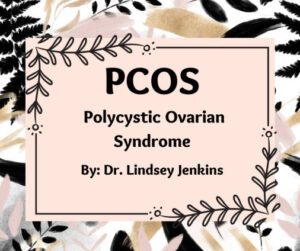 It’s Dr. Jenkins again, this time talking about polycystic ovarian syndrome or PCOS. PCOS is one of the most common conditions we treat in gynecology. It is an incredibly complex syndrome with significant health implications. A VERY basic explanation of PCOS is there is a disruption in the signal from the brain to the ovary to release an egg each month. This results in increased estrogen levels and infrequent periods. Some of this excess estrogen is converted by the body to testosterone. The body also often develops resistance to insulin which results in pre-diabetes or diabetes. Unfortunately, there is a lot of misinformation surrounding the diagnosis of PCOS. To be diagnosed with PCOS a woman must have 2 of 3 criteria: 1) Irregular, infrequent periods, 2) signs of elevated testosterone levels (hair growth on upper lip or chin, increased clitoral size, etc), or 3) polycystic appearance of the ovaries on ultrasound. It should be noted the “cysts” on the ovaries with polycystic ovarian syndrome are eggs waiting to be released but due to the hormonal disruption with PCOS, ovulation does not occur. Many women with PCOS assume their ovaries contain large cysts but these cysts are small and tend to cluster along the edges of the ovary in a “string of pearls” pattern. It should also be noted, the cysts of PCOS do NOT cause pain. Many women with pelvic pain who also have PCOS are incorrectly told it is the PCOS which is causing pain. What PCOS IS associated with (aside from the above-mentioned infrequent periods and increased hair growth) is an increased risk for diabetes, high cholesterol, inability to lose weight and weight gain, uterine cancer, and infertility. Now, while PCOS is associated with infertility this DOES NOT mean that all women with PCOS are infertile. I have had many patients with PCOS who have been told by a previous provider they could not get pregnant only to find themselves experiencing an unplanned pregnancy. PCOS may make it more difficult to conceive but many women with PCOS have NO trouble conceiving. If you have PCOS you should still use birth control until you are ready to become pregnant. PCOS is more commonly seen in women with higher a BMI however it can affect women with a normal BMI. If you are concerned you may have PCOS, please make an appointment with our office! Our evaluation will include a detailed, history, exam, lab work and an ultrasound.
It’s Dr. Jenkins again, this time talking about polycystic ovarian syndrome or PCOS. PCOS is one of the most common conditions we treat in gynecology. It is an incredibly complex syndrome with significant health implications. A VERY basic explanation of PCOS is there is a disruption in the signal from the brain to the ovary to release an egg each month. This results in increased estrogen levels and infrequent periods. Some of this excess estrogen is converted by the body to testosterone. The body also often develops resistance to insulin which results in pre-diabetes or diabetes. Unfortunately, there is a lot of misinformation surrounding the diagnosis of PCOS. To be diagnosed with PCOS a woman must have 2 of 3 criteria: 1) Irregular, infrequent periods, 2) signs of elevated testosterone levels (hair growth on upper lip or chin, increased clitoral size, etc), or 3) polycystic appearance of the ovaries on ultrasound. It should be noted the “cysts” on the ovaries with polycystic ovarian syndrome are eggs waiting to be released but due to the hormonal disruption with PCOS, ovulation does not occur. Many women with PCOS assume their ovaries contain large cysts but these cysts are small and tend to cluster along the edges of the ovary in a “string of pearls” pattern. It should also be noted, the cysts of PCOS do NOT cause pain. Many women with pelvic pain who also have PCOS are incorrectly told it is the PCOS which is causing pain. What PCOS IS associated with (aside from the above-mentioned infrequent periods and increased hair growth) is an increased risk for diabetes, high cholesterol, inability to lose weight and weight gain, uterine cancer, and infertility. Now, while PCOS is associated with infertility this DOES NOT mean that all women with PCOS are infertile. I have had many patients with PCOS who have been told by a previous provider they could not get pregnant only to find themselves experiencing an unplanned pregnancy. PCOS may make it more difficult to conceive but many women with PCOS have NO trouble conceiving. If you have PCOS you should still use birth control until you are ready to become pregnant. PCOS is more commonly seen in women with higher a BMI however it can affect women with a normal BMI. If you are concerned you may have PCOS, please make an appointment with our office! Our evaluation will include a detailed, history, exam, lab work and an ultrasound.
There are many treatments available for PCOS and treatment is dictated by your goals. If the goal is pregnancy, life-style changes (such as weight loss and dietary changes) may be an important part of recommended treatment. Medications to help with insulin resistance and to address lack of ovulation are also commonly used. If pregnancy is not the goal, we often use birth control to help with cycle regulation and to protect from the development of endometrial cancer. Other medications are also available to reduce the masculinizing features of PCOS. Don’t hesitate to come see us if you are concerned about PCOS or if you have already been diagnosed with PCOS and are interested in treatment!
We are accepting new patients! To schedule an appointment with OBGYN Associates, call us at 515-288-3287.
DISCLAIMER: All information on this website is provided for informational purposes only and is not intended to be construed as medical advice. OBGYN Associates shall not be liable for any errors or inaccuracies contained herein, or any actions taken in reliance thereon.

It’s Dr. Jenkins again, this time talking about polycystic ovarian syndrome or PCOS. PCOS is one of the most common conditions we treat in gynecology. It is an incredibly complex syndrome with significant health implications. A VERY basic explanation of PCOS is there is a disruption in the signal from the brain to the ovary to release an egg each month. This results in increased estrogen levels and infrequent periods. Some of this excess estrogen is converted by the body to testosterone. The body also often develops resistance to insulin which results in pre-diabetes or diabetes. Unfortunately, there is a lot of misinformation surrounding the diagnosis of PCOS. To be diagnosed with PCOS a woman must have 2 of 3 criteria: 1) Irregular, infrequent periods, 2) signs of elevated testosterone levels (hair growth on upper lip or chin, increased clitoral size, etc), or 3) polycystic appearance of the ovaries on ultrasound. It should be noted the “cysts” on the ovaries with polycystic ovarian syndrome are eggs waiting to be released but due to the hormonal disruption with PCOS, ovulation does not occur. Many women with PCOS assume their ovaries contain large cysts but these cysts are small and tend to cluster along the edges of the ovary in a “string of pearls” pattern. It should also be noted, the cysts of PCOS do NOT cause pain. Many women with pelvic pain who also have PCOS are incorrectly told it is the PCOS which is causing pain. What PCOS IS associated with (aside from the above-mentioned infrequent periods and increased hair growth) is an increased risk for diabetes, high cholesterol, inability to lose weight and weight gain, uterine cancer, and infertility. Now, while PCOS is associated with infertility this DOES NOT mean that all women with PCOS are infertile. I have had many patients with PCOS who have been told by a previous provider they could not get pregnant only to find themselves experiencing an unplanned pregnancy. PCOS may make it more difficult to conceive but many women with PCOS have NO trouble conceiving. If you have PCOS you should still use birth control until you are ready to become pregnant. PCOS is more commonly seen in women with higher a BMI however it can affect women with a normal BMI. If you are concerned you may have PCOS, please make an appointment with our office! Our evaluation will include a detailed, history, exam, lab work and an ultrasound.
There are many treatments available for PCOS and treatment is dictated by your goals. If the goal is pregnancy, life-style changes (such as weight loss and dietary changes) may be an important part of recommended treatment. Medications to help with insulin resistance and to address lack of ovulation are also commonly used. If pregnancy is not the goal, we often use birth control to help with cycle regulation and to protect from the development of endometrial cancer. Other medications are also available to reduce the masculinizing features of PCOS. Don’t hesitate to come see us if you are concerned about PCOS or if you have already been diagnosed with PCOS and are interested in treatment!
We are accepting new patients! To schedule an appointment with OBGYN Associates, call us at 515-288-3287.
DISCLAIMER: All information on this website is provided for informational purposes only and is not intended to be construed as medical advice. OBGYN Associates shall not be liable for any errors or inaccuracies contained herein, or any actions taken in reliance thereon.





Leave A Comment